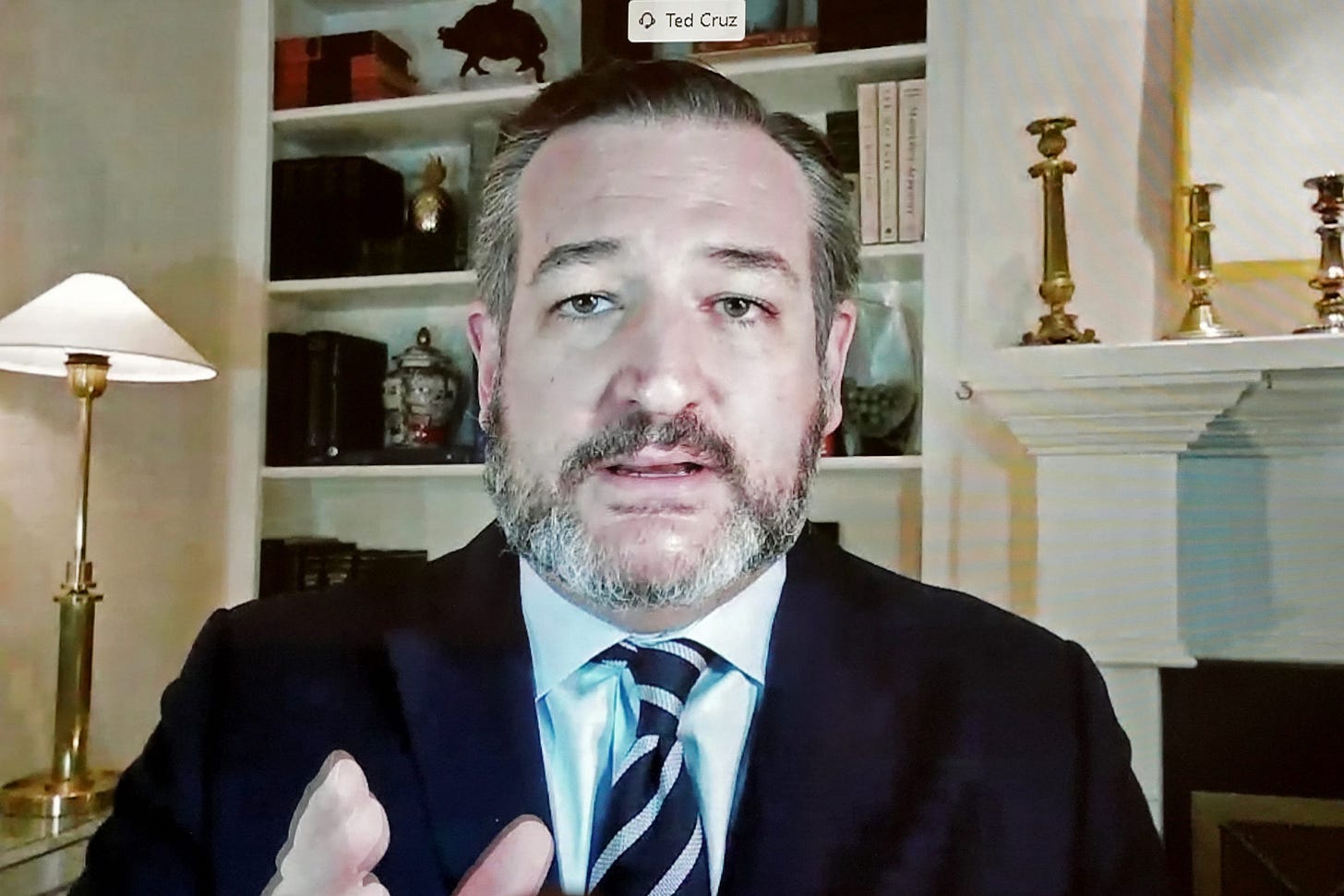Ted Cruz Wants to Toss Out 7 Million People’s Votes. Appalling.
The ‘constitutionalist’ senator volunteers to help make the case at the Supreme Court.

Ladies and gentleman, Fox News reports—this is “breaking,” mind you—that the junior senator from Texas, Ted Cruz, has graciously agreed to argue on behalf of Rep. Mike Kelly (R-Penn.), congressional candidate Sean Parnell, and Pennsylvania state representative candidate Wanda Logan, in a hypothetical oral argument in the Supreme Court regarding—as Cruz puts it—“the constitutionality of the POTUS election results in PA.”
Hypothetically, this argument could occur on a hypothetical grant of Kelly’s hypothetical petition for certiorari from the unanimous decision by the Pennsylvania Supreme Court to toss out Kelly’s lawsuit seeking to cancel millions of votes cast by mail in Pennsylvania this cycle. Given the severe time crunch—with electors set to vote across the nation on December 14—Kelly and crew last week filed an interim “Emergency Application for Writ of Injunction Pending the Filing and Disposition of a Petition for Writ of Certiorari,” which Justice Samuel Alito has authority to grant or deny.
And here comes Cruz to lend a hand:
Whew! Now that Cruz is on the constitutional job, we can finally relax. The certified vote counts don’t resolve anything—only five unelected individuals on the U.S. Supreme Court can resolve the election!
Cruz must know what he’s talking about, right? After all, he went to Harvard Law School, holds a degree in public policy from Princeton, served as Texas solicitor general, authored 70 Supreme Court briefs, and argued before the Court nine times. And of course Cruz must have our best constitutional interests at heart, since he calls himself a “constitutional conservative,” has a long reputation as a strict constructionist, and is an avowed opponent of “judicial activism” and supporter of “judicial restraint.” We are saved!
But let’s consider for a moment the lawsuit that Cruz promises to rescue from the clutches of the Pennsylvania Supreme Court—the highest court in the land on questions of Pennsylvania state law.
Act 77 of 2019 established universally available mail-in voting in the Commonwealth of Pennsylvania: Any registered voter who wanted a mail-in ballot could apply for and receive one without having to explain why.
Team Kelly argues that, even though election procedures are a matter of state law, the federal Constitution was violated when the Pennsylvania legislature decided to expand mail-in voting prior to the November 3 election because the Pennsylvania legislature in fact doesn’t have the power under the Pennsylvania constitution to authorize mail-in voting in Pennsylvania.
What’s more, Kelly’s lawyers argue, the Supreme Court of Pennsylvania’s dismissal of their case violated the individual constitutional rights of Kelly and the two candidates for office who joined him as plaintiffs. They claim transgressions of the First and Fourteenth Amendments to the U.S. Constitution. And as relief, they seek the vulgar disenfranchisement of up to 6.9 million voters—whose ballots were duly cast, counted, and certified pursuant to Pennsylvania law. In other words, because these three candidates claim that their individual constitutional rights were violated, they argue that the Pennsylvania legislature should ignore the 6.9 million votes and unilaterally choose Pennsylvania’s electors in their stead. For Trump, of course.
You got that right. Cruz—the strict constructionist—is eager to stand before the U.S. Supreme Court to argue that the Pennsylvania legislature had no power to allow universal mail-in voting, but does have the power to throw out every single vote cast in Pennsylvania and impose its own political will on the citizens of Pennsylvania, who chose Joe Biden for president by a nearly 82,000-vote margin over Donald Trump.
For its part, the unanimous Pennsylvania Supreme Court chided the plaintiffs for their “failure to act with due diligence in commencing their facial constitutional challenge, which was ascertainable upon Act 77’s enactment.” Had they sued when the legislation passed a year ago, millions of Pennsylvanians’ votes would not now hang in the balance. Too late, baby.
In response, Mike Kelly and company argue that they “had no specialized knowledge” to even know that they’d “been harmed by an unconstitutional election.” Kelly is only a sitting member of the U.S. House of Representatives, after all. In fairness to him, Pennsylvania voters should have to remedy his injury by sacrificing their millions of constitutionally cast votes.
It doesn’t take a trained lawyer to grasp the tortured nature of these arguments, and the obvious reality that basic decency and fairness weigh in favor of Pennsylvania voters, full stop.
Keep in mind, too, that the U.S. Supreme Court has stated that “our only power over state judgments is to correct them to the extent that they incorrectly adjudge federal rights.” Without any federal interplay, the Pennsylvania Supreme Court is normally the last word on the Pennsylvania constitution.
The Kelly plaintiffs attempt an end-run around this inconvenience. They argue that, by refusing to hear their stale claim, the Pennsylvania Supreme Court denied them the right to due process under the U.S. Constitution. They filed a claim in court and it was rejected. That’s “process”—i.e., elementary notice and an opportunity to be heard by a neutral tribunal. At least that’s what regular people get in America.
And what about a “strict constructionist,” plain-language analysis under the Constitution—the kind that Cruz is so fond of?
Well, Article I, Section 4 states that “the Times, Places and Manner of holding Elections for Senators and Representatives, shall be prescribed in each State by the Legislature.” For presidential elections, Article II, Section 1 states that “each State shall appoint, in such Manner as the Legislature thereof may direct, a Number of Electors.”
Translation: State legislatures decide election laws, including those governing elections for president. That happened here, counsel.



